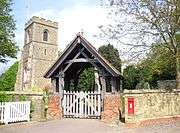Norton, Hertfordshire
Norton is a small village in Hertfordshire, one of the three original villages which were absorbed into Letchworth Garden City, the other two being Willian and Old Letchworth. The village is known to have existed by 1007,[1] with remains of the medieval settlement visible as earthworks in a field beside the church. However, the history of the village goes back even further than that.[2]
History of Norton
Archaeological excavations in Norton have revealed evidence of human activity in the area going back to before around 3000 BC.[3] People lived at different sites in the village during the Neolithic, Bronze and Iron Age, with continuity into the Roman period. Anglo-Saxon occupation is evident from a small cemetery discovered at Blackhorse Road in 1957[4] and a settlement discovered at Kristiansand Way in 1989, thought to be the lost site of Rodenhanger.[5] It was during this latter period that the first written evidence about Norton appeared. A charter relating to Norton dating from AD 1007 is the earliest document to survive, recording its donation to the Abbey of St Albans and claiming that it had originally been given by Offa, King of Mercia, in the eighth century, together with Rodenhanger, a lost site said to lie together with Norton. The manor appeared in the Domesday Book of 1086, when it was listed among the lands belonging to the Abbots of St Albans. The records of the manorial courts, which date from AD 1244, give an extensive overview of the life of Norton's villagers during the medieval period. Following the Dissolution of St Albans Abbey in 1539 the manor of Norton passed into private hands, but its manorial courts continued to record the activities of its villagers until 1916.
The village church, the Church of St Nicholas, dating back to the early twelfth century AD, is dedicated to St Nicholas, and has eight light bells hung for change ringing. Since the construction in the same parish of the much larger St George's church in the town, St Nicholas's has become a chapel of ease. It is still used regularly from Easter to October, and is very popular for wedding ceremonies.
'Gypsy' Smith

Polly and Cornelius Smith, the parents of Rodney "Gypsy" Smith, the famous international evangelist, are buried in the churchyard at Norton, Polly having died from smallpox in 1865 while the family was passing through the parish. Cornelius Smith was also a well-known evangelist, often preaching the Gospel with his two brothers. 'Gypsy' Smith maintained contact with Norton, visiting his parents grave as often as he could. In 1934, the Letchworth Methodist Circuit decided that a new church was needed in Norton Village. It was thought appropriate to dedicate the new building in memory of 'Gypsy' Smith's parents, and Smith raised a large sum of money for the building himself, with donations being sent from the UK and the United States.
The new chapel was opened by Smith's daughter Zillah and her husband Mr J T Lean in 1934 as Norton Methodist Mission, and it was given a distinctive caravan-shaped pulpit. Later, 'Gypsy' Smith himself and his brother Ezekiel conducted evangelical meetings at the church, one of the very rare occasions when the two brothers appeared on the same platform. The building is still in use today as the North Avenue Methodist Church.
Schools
The village's primary school, named after the church, was founded in 1873. A nearby secondary school, Norton School, founded in 1906, served the village and the area around it but was closed in 2002 with the school and its playing fields being developed for housing.
Gallery
-

View of the lych gate
-
The school of Norton St Nicholas
-

The 'Three Horseshoes' public house
References
- ↑ Giles, D 2003 Norton before the Garden City. Second edition. The Print Factory, p 11
- ↑ Turner, C 1995 Norton Archaeological Background. Available from Norton Community Archaeology Group website as a PDF download
- ↑ Moss-Eccardt, J 1988 'Archaeological Investigations in the Letchworth Area, 1958-1974' in Proceedings of the Cambridge Antiquarian Society 77, 35-103, p 44ff
- ↑ Moss-Eccardt, J 1971 'An Anglo-Saxon cemetery at Blackhorse Road, Letchworth, Hertfordshire' in Beds Archaeological Journal 6, 27-32
- ↑ Matthews, K J & Burleigh, G R 1989 'A Saxon and early medieval settlement at Green Lane, Letchworth' in Hertfordshire's Past (26) (Spring 1989), 27-31
Further reading
- Giles, D 2003 Norton before the Garden City. Second edition. Deborah and Anthony Giles.
- Harrison, R & Walker, D 2006 David’s Book of Letchworth: First Garden City, A Brief History and Practical Guide. David’s Bookshop
- Johnson, K 1976 The Book of Letchworth: an illustrated record. Barracuda.
- Lazell, D 1970 From the Forest I Came: the Story of Gipsy Rodney Smith MBE. Concordia Press. ISBN 0-570-00010-6
- Miller, M 2002 Letchworth: the first Garden City. Second edition. Phillimore.
- Smith, R 1925 Gypsy Smith: His Life and Work. Revised edition.
External links
| Wikimedia Commons has media related to Norton, Hertfordshire. |
- Norton St Nicholas CofE (VA) Primary School
- Norton Community Archaeology Group website
- A Guide to Old Hertfordshire webpage for Norton
Coordinates: 51°59′37″N 0°12′46″W / 51.9936°N 0.2127°W
